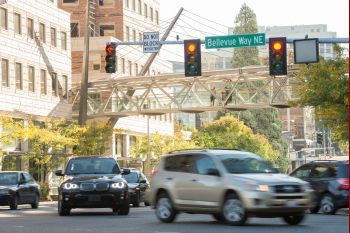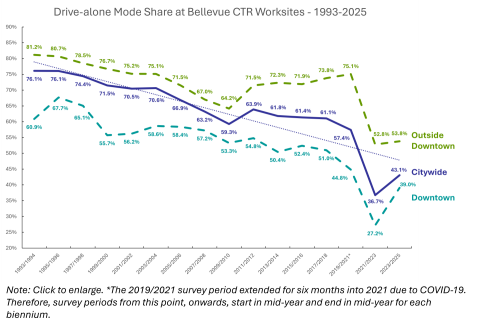
In an effort to reduce congestion on highways and local streets, the state supports programs that lower the number of cars, particularly those with one occupant, on the roads during peak travel periods.
The City of Bellevue is required by the state to maintain a Commute Trip Reduction plan, which is focused on employers citywide with 100 or more employees who work 35 hours or more and report to work between 6 and 9 a.m. The most recent 2025-2029 CTR Plan update was adopted by the Bellevue City Council on September 16, 2025. By state and city law (listed under Bellevue City Code 14.40), Choose Your Way Bellevue offers details to help employers draft CTR programs and provides information about travel options in Bellevue.
As of November 2025, there are 76 affected worksites in Bellevue with over 45,000 employees, which is nearly one-third of all workers in the city. From 1993 to 2025, Bellevue's CTR-affected employers lowered the rate of people commuting by drive-alone options from approximately 76 percent to 43 percent overall. Downtown CTR employers reduced their drive-alone rate from 61 percent to 39 percent, and employers outside downtown reduced their drive-alone rate from 81 percent to 54 percent.
Note: Click to enlarge. *The 2019/2021 survey period extended for six months into 2021 due to COVID-19. Therefore, the 2021/2023 survey period started in mid-year 2021 and ended mid-year 2023. All but three worksites conducted their surveys prior to COVID-19 for the 2019-2021 cycle.
Additional CTR information
- The city’s CTR Implementation Guidelines provide additional details for implementation of the law in Bellevue.
- The Washington State Department of Transportation offers detailed information about the Commute Trip Reduction law.
- A checklist helps employers determine if their organization is affected under the CTR law.
- More questions and answers about Commute Trip Reduction requirements are found below (last updated January 2021)
What is Commute Trip Reduction (CTR)?
Washington's CTR Law (RCW 70.94.527), adopted by the legislature in 1991 and revised in 2006, is incorporated into the Washington Clean Air Act. Its purpose is to improve air quality, reduce traffic congestion and minimize energy consumption by encouraging people to utilize ways to get to work other than driving alone.
The law requires affected employers in the most congested areas of the state to promote commute alternatives such as transit, carpool, vanpool, bicycling, walking, working from home, compressed work weeks and flexible work schedules. It also requires jurisdictions to work toward trip reduction targets and coordinate with regional governments.
Why should people care about CTR?
Wherever congestion occurs, the delay in employee productivity and freight delivery translates to lost money. Washington's economic vitality depends on personal mobility and the efficient movement of goods and materials. Reducing the proportion of single-occupant vehicles and number of vehicle miles traveled increases the efficiency of our roadway space.
In a 2017-18 CTR survey, commuters at worksites statewide who participated in commute trip reduction left about 34,500 cars at home every weekday, opting instead to commute by bus, vanpool, train, bicycle, foot or to telework. These alternative commute trips reduced almost 13 percent of daily vehicle miles traveled per employee between 2007 & 2018.
Which employers are affected by the state's CTR law?
The CTR law affects both public and private employers that have 100 or more full-time (35 hours or more per week) employees who: work at a single worksite located in one of the state’s most congested corridors; and who begin work between 6 and 9 a.m. on two or more weekdays for at least 12 continuous months. More information can be found in RCW 70.94.527
The law applies in certain urban growth areas of the state with a state highway segment exceeding one hundred person hours of delay. Most jurisdictions in King County, including Bellevue, are required to implement the CTR law. Affected jurisdictions are required to pass a local CTR ordinance with specific requirements for that jurisdiction. Bellevue’s city-specific CTR requirements are in Chapter 14.40 of the Bellevue City Code.
What are the goals for CTR-affected employers?
Every two years affected employers use a state-supplied survey to ask employees how they get to work, how many miles they travel to work and other questions about their commute habits.
The survey results are used to measure the employers’ progress against assigned baseline values (the baseline year is 2008 or the year they became affected, whichever is later) for non-drive-alone rate and vehicle miles traveled (VMT).
If an employer meets either the non-drive-alone rate or VMT goal, it is considered to have made goal. The goals are 16.3% increase in non-drive-alone rate and 18% reduction in VMT after four years.
What are employers required to do under the CTR law?
An affected employer must make a good-faith effort to develop and implement a CTR program. This means, at minimum, doing the following:
- Designating an employee transportation coordinator (ETC)
- Displaying the ETC's name and contact information where employees are likely to see it
- Distributing information to employees about commute alternatives to driving alone
- Implementing a set of measures geared toward achieving the CTR goals
- Surveying employees about their commuting habits every two years
- Reporting regularly about progress toward meeting CTR goals
- Adjusting their program elements/offerings if not making progress toward goal
How can employers encourage the use of commute alternatives to driving alone?
Under the CTR law, an employer must implement a program to reduce commute trips to the worksite. However, employee transportation coordinators are only limited by their imagination. Popular program elements include:
- Encouraging ridesharing by matching employees for carpools and vanpools
- Encouraging transit ridership by subsidizing passes or vanpool fares
- Allowing employees to work from home one or two days per week
- Implementing parking management programs that minimize drive-alone commuting by charging employees for parking, providing commuter parking on a daily basis and/or designating preferred parking for carpools and vanpools
- Installing showers, lockers and bicycle racks for bikers and walkers
- Offering flexible work schedules that allow people to alter their start and quit times in order to take advantage of alternative commute options
- Setting up company-wide trip logging/reward networks (for instance, on www.RideshareOnline.com)
What if an employer doesn't comply with CTR requirements or meet its CTR goal?
The CTR goals are just that, goals. If the employer is making a good-faith effort to implement its CTR program, it cannot be penalized for failure to meet the CTR goals. Employers that don't make progress will be asked by their city or county to revise their programs to make them more effective.
Cities and counties are there to work with employers to create successful programs, not to penalize employers who don't succeed. However, civil penalties may be assessed for failing to meet the minimum requirements described above or making a good faith effort to comply with the requirements of the law.

